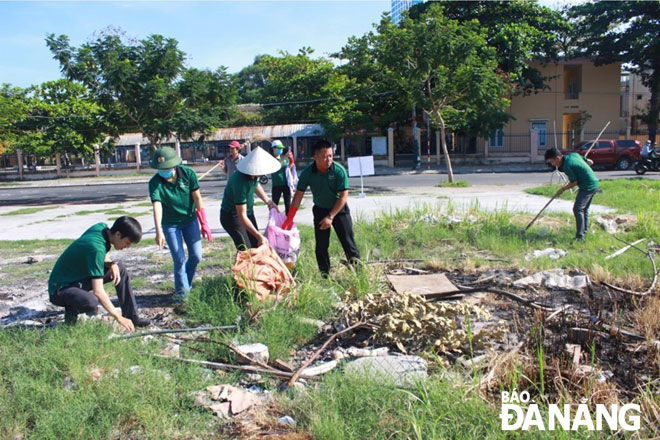Promoting sustainable development of green tourism
Green tourism is a type of tourism that minimises negative impact on the environment while travelling, positively contributes to biodiversity protection, uses renewable energy, promotes the values of natural and cultural heritages, and developes environmentally-friendly products.
 |
| Some employees from the Muong Thanh Grand Da Nang hotel cleaning up the garbage on a vacant land lot in the city |
Green tourism businesses are those actively engaged in reducing the negative environmental and social impacts of their tourism operations.
Apart from diversifying and enhancing the quality of their tourism products, Da Nang-based travel agencies have been focusing on effectively ensuring the green and clean tourism environment during their operation.
In particular, the city’s branch of the Viet Nam Travel and Marketing Transports JSC (Vietravel) has encouraged its employees to use their personal cups and belongings, and to sort waste at source in their company.
Vietravel Director Doan Hai Dang said his company has been conveying the message of ‘Go green - Travel Without Litter’ to all of its staff and tourists.
Besides, the travel company has asked restaurants to provide their meal services for their customers to replace disposable cups and straws with environmentally-friendly ones.
Last month, the Muong Thanh Hotel Group pioneered in replacing single-use plastic items such as straws, carry-on boxes, cups and bags with environmentally and health friendly ones in the Muong Thanh Hospitality chain nationwide.
In addition, the ‘Plastic Transformer Challenge’ campaign has been launched by the group in a bid to encourage visitors and the community to actively participate in environmental protection activities.
Meanwhile, the Melia Hotels & Resorts Group has launched a campaign on stopping the use of plastic products to replace them with paper and bamboo ones.
More interestingly, a 'Soap for Hope' recycling programme has been launched across the city.
Accordingly, disposable soap bars which are collected from hotels and resorts have their surface cleaned by a machine to remove an outer layer. Once surface cleaning is complete, the soap is mixed with a sterilisation solution. Sterilized soap is then sent through a grinder in mass quantities. Finally, ground soap is then pressed to form new bars which will then be donated to those in need in remote and rural areas.
In addition to hotels, many coffee shops have become actively involved in protecting environment by reducing the use of plastic products by replacing them with stainless steel, glass, and bamboo ones.
Included are the Trinh Coffee on Chau Thi Vinh Te Street, the Goc Nha Tui Minh café nestled in the alley No 36/36 on Le Duan Street, the Goom coffee shop on Nguyen Chi Thanh Street, and the Tipi coffee shop on Pham Van Nghi Street.
The Trinh coffee shop’s owner Nguyen Quang Thanh Son, said his coffee has been put into operation for 6 months. Initially, his shop used bamboo straws, but his visitors hesitated to use re-useable straws which are not always hygienic or easy to clean.
Therefore, in attempting to win the trust of customers, Mr Son has replaced bamboo straws with glass and stainless steel ones which are easier to clean. Thanks to this, customers feel more confident as using these types of straws.
Ms Vo Thi Truong Quynh, a visitor from Hue City, said this was the first time she had used stainless steel straw at a coffee shop. She remarked Da Nang was one of Viet Nam’s pioneering localities in ensuring a green, clean and beautiful tourism environment.
Deputy Director of the municipal Department of Tourism Nguyen Xuan Binh said his agency has been encouraging both residents, visitors, and travel businesses to join efforts with the local authorities to build an environmentally-friendly tourism environment to attract even more visitors to the city.